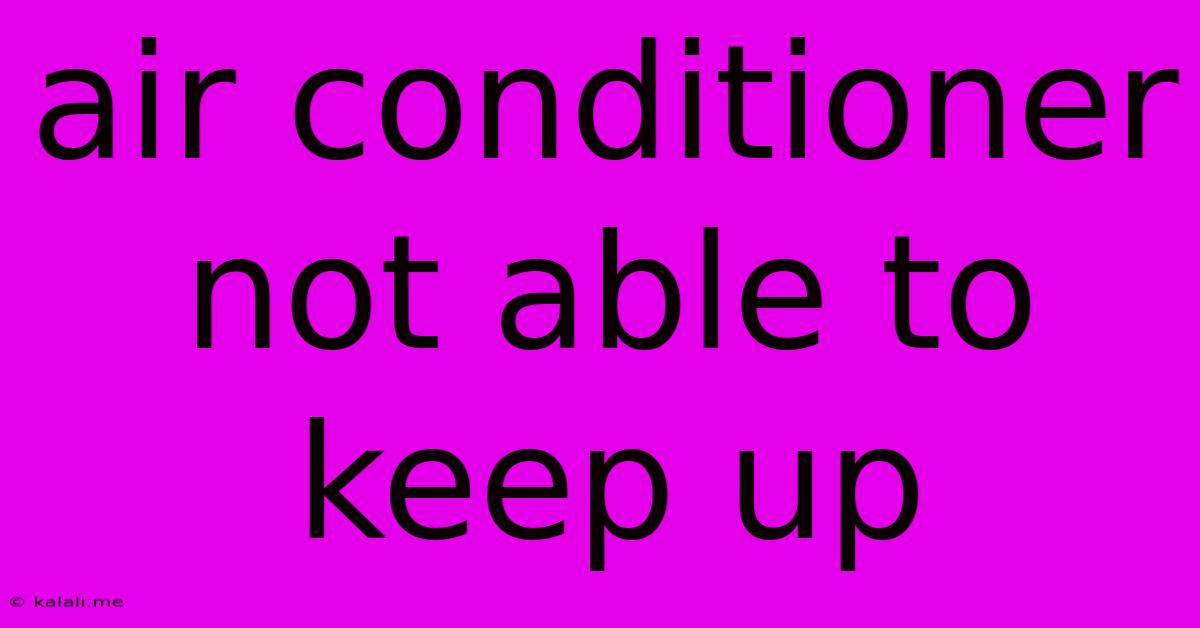Air Conditioner Not Able To Keep Up
Kalali
Jun 07, 2025 · 3 min read

Table of Contents
Air Conditioner Not Keeping Up? Troubleshooting Tips and Solutions
Is your air conditioner struggling to keep your home cool? A malfunctioning AC unit can be frustrating, leading to uncomfortable temperatures and increased energy bills. This article explores common reasons why your AC might not be keeping up and provides practical troubleshooting steps to get your system back on track. We'll cover everything from simple fixes you can attempt yourself to situations requiring professional assistance.
Why Your AC Might Be Struggling
There are several factors that can cause your air conditioner to fail to adequately cool your home. These can range from minor issues easily resolved to more serious problems requiring professional repair. Understanding these potential causes is the first step towards finding a solution.
1. Dirty Air Filter: This is the most common and often easiest fix. A clogged air filter restricts airflow, forcing your AC unit to work harder and potentially reducing its cooling capacity. Check and clean or replace your filter regularly (ideally every month during peak usage). A clean filter ensures optimal airflow and efficiency.
2. Refrigerant Leaks: Refrigerant is the crucial component responsible for cooling. A leak leads to insufficient refrigerant, dramatically reducing cooling capacity. This requires professional attention. You can't safely repair a refrigerant leak yourself; attempting to do so can be dangerous. Low refrigerant levels will usually be indicated by low air output and weak cooling.
3. Frozen Evaporator Coil: Ice buildup on the evaporator coil restricts airflow and prevents proper heat absorption. This is often a symptom of a dirty air filter, insufficient airflow, or refrigerant issues. Defrosting might be necessary, but only if you're comfortable handling your unit. Otherwise, call a professional.
4. Issues with the Condenser Unit: The condenser unit (located outside) dissipates heat. Dirt, debris, or overgrown vegetation obstructing airflow around the condenser significantly hampers its function. Regular cleaning of the condenser unit is crucial for optimal performance. This includes cleaning the fins and ensuring adequate clearance.
5. Oversized or Undersized Unit: An improperly sized AC unit is a common culprit. An oversized unit cycles on and off too quickly, preventing it from adequately dehumidifying and cooling the space. Conversely, an undersized unit struggles to keep up with the cooling demand. This is something to consider if you've recently had your system installed or are experiencing chronic cooling problems.
6. Ductwork Problems: Leaky or poorly insulated ducts can cause significant energy loss and reduced cooling efficiency. Air leaks reduce the amount of cool air reaching your living spaces. Repairing or sealing duct leaks is essential for optimal performance. This often involves professional inspection and repair.
7. Electrical Issues: Problems with your electrical system, such as insufficient voltage or a faulty capacitor, can also affect your AC's ability to function correctly. This requires the expertise of a qualified electrician. Do not attempt any electrical repairs yourself.
8. Age and Wear: Older AC units are more prone to malfunctions and reduced efficiency. Regular maintenance can extend their lifespan, but eventually, replacement might become necessary. Consider the age and overall condition of your unit. If repairs become frequent and costly, a new system may be more cost-effective in the long run.
Troubleshooting Steps:
- Check the air filter: This is always the first step. A clean filter can often resolve minor cooling issues.
- Inspect the condenser unit: Ensure it's clean and free of debris.
- Listen for unusual noises: Unusual sounds like rattling or grinding can indicate underlying mechanical problems.
- Check the thermostat: Make sure it's correctly set and functioning properly.
When to Call a Professional:
If you've tried basic troubleshooting and your AC is still not keeping up, it's time to call a qualified HVAC technician. They have the expertise and tools to diagnose and repair more complex issues, such as refrigerant leaks, electrical problems, or major component failures.
By understanding the common causes of AC problems and following these troubleshooting steps, you can improve your chances of resolving cooling issues quickly and efficiently. Remember that regular maintenance is key to preventing major problems and ensuring your AC unit runs optimally throughout its lifespan.
Latest Posts
Latest Posts
-
How To Clean Rusty Bbq Grill Grates
Jun 08, 2025
-
Was John The Baptist A Cousin Of Jesus
Jun 08, 2025
-
Water Dripping From Ac Pipe Outside
Jun 08, 2025
-
Dwarf Fortress Dwarves Keep Getting Injured
Jun 08, 2025
-
How Do You Make Glass Panes In Minecraft
Jun 08, 2025
Related Post
Thank you for visiting our website which covers about Air Conditioner Not Able To Keep Up . We hope the information provided has been useful to you. Feel free to contact us if you have any questions or need further assistance. See you next time and don't miss to bookmark.